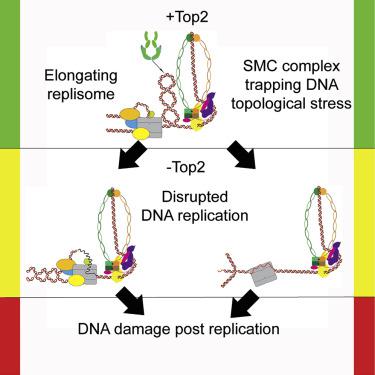Our official English website, www.x-mol.net, welcomes your
feedback! (Note: you will need to create a separate account there.)
Cohesin Causes Replicative DNA Damage by Trapping DNA Topological Stress.
Molecular Cell ( IF 14.5 ) Pub Date : 2020-04-06 , DOI: 10.1016/j.molcel.2020.03.013 Nicola Elizabeth Minchell 1 , Andrea Keszthelyi 1 , Jonathan Baxter 1
Molecular Cell ( IF 14.5 ) Pub Date : 2020-04-06 , DOI: 10.1016/j.molcel.2020.03.013 Nicola Elizabeth Minchell 1 , Andrea Keszthelyi 1 , Jonathan Baxter 1
Affiliation

|
DNA topological stress inhibits DNA replication fork (RF) progression and contributes to DNA replication stress. In Saccharomyces cerevisiae, we demonstrate that centromeric DNA and the rDNA array are especially vulnerable to DNA topological stress during replication. The activity of the SMC complexes cohesin and condensin are linked to both the generation and repair of DNA topological-stress-linked damage in these regions. At cohesin-enriched centromeres, cohesin activity causes the accumulation of DNA damage, RF rotation, and pre-catenation, confirming that cohesin-dependent DNA topological stress impacts on normal replication progression. In contrast, at the rDNA, cohesin and condensin activity inhibit the repair of damage caused by DNA topological stress. We propose that, as well as generally acting to ensure faithful genetic inheritance, SMCs can disrupt genome stability by trapping DNA topological stress.
中文翻译:

粘连蛋白通过捕获 DNA 拓扑应力引起复制性 DNA 损伤。
DNA 拓扑应激会抑制 DNA 复制叉 (RF) 的进展并导致 DNA 复制应激。在酿酒酵母中,我们证明着丝粒 DNA 和 rDNA 阵列在复制过程中特别容易受到 DNA 拓扑应力的影响。 SMC 复合物粘连蛋白和凝缩蛋白的活性与这些区域中 DNA 拓扑应力相关损伤的产生和修复有关。在富含粘连蛋白的着丝粒处,粘连蛋白活性导致 DNA 损伤、RF 旋转和预连接的积累,证实粘连蛋白依赖性 DNA 拓扑应力会影响正常的复制进程。相反,在 rDNA 中,粘连蛋白和凝缩蛋白活性抑制 DNA 拓扑应力引起的损伤的修复。我们认为,除了通常确保忠实的遗传遗传之外,SMC 还可以通过捕获 DNA 拓扑应力来破坏基因组稳定性。
更新日期:2020-04-06
中文翻译:

粘连蛋白通过捕获 DNA 拓扑应力引起复制性 DNA 损伤。
DNA 拓扑应激会抑制 DNA 复制叉 (RF) 的进展并导致 DNA 复制应激。在酿酒酵母中,我们证明着丝粒 DNA 和 rDNA 阵列在复制过程中特别容易受到 DNA 拓扑应力的影响。 SMC 复合物粘连蛋白和凝缩蛋白的活性与这些区域中 DNA 拓扑应力相关损伤的产生和修复有关。在富含粘连蛋白的着丝粒处,粘连蛋白活性导致 DNA 损伤、RF 旋转和预连接的积累,证实粘连蛋白依赖性 DNA 拓扑应力会影响正常的复制进程。相反,在 rDNA 中,粘连蛋白和凝缩蛋白活性抑制 DNA 拓扑应力引起的损伤的修复。我们认为,除了通常确保忠实的遗传遗传之外,SMC 还可以通过捕获 DNA 拓扑应力来破坏基因组稳定性。











































 京公网安备 11010802027423号
京公网安备 11010802027423号